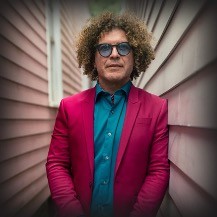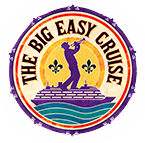Get to Know Preservation Hall’s Ben Jaffe

It’s one of the most serendipitous stories in American music.
December 1960: Allan Jaffe marries Sandra Smolen in Philadelphia. Allan has been to New Orleans and wants Sandra to see the city. Like countless others before and since, they hear the music, meet the people, and stay.
June 1961: Preservation Hall opens. Almost right away, the Jaffes take it over.
January 1971: Their son, Ben, is born.
March 1987: Allan dies. Ben eventually takes over Preservation Hall.
Now let Ben tell you a little more about how it all went down.
Still curious? You can ask him in person because the Preservation Hall Jazz Band will join us on THE 2026 BIG EASY CRUISE. Ben will be the guy playing bass and tuba.
What led your parents to New Orleans?
My dad was from Pottsville, Pennsylvania. He played the sousaphone—a kind of tuba. He attended Valley Forge Military Academy on a music scholarship, but he was a huge fan of Louis Armstrong’s Hot Five and Hot Seven recordings. He’d grown up during the nineteen-fifties New Orleans jazz revival when a lot of East Coast teenagers discovered early American music.
My parents didn’t come to New Orleans to start Preservation Hall. They came because my dad had been stationed at Fort Polk, Louisiana. He’d been to New Orleans and he wanted to explore the city with my mother on an extended honeymoon. They happened upon an event in Jackson Square presented by Tulane University. It was the Eureka Brass Band. My father found out that some of the musicians gathered at an art gallery on St. Peter Street, so that’s where they went. In pretty short order, the gallery moved, the old gallery became Preservation Hall, and my parents were running it.
Were they concerned that when the older musicians died, that there would be no one to play there?
Their motivation and drive came from wanting to celebrate the living pioneers of New Orleans jazz. Their commitment to themselves was that they would remain until the passing of Civil Rights legislation. They thought the hall would last for maybe four or five years. When they started, they took other jobs to support themselves and Preservation Hall. Looking back, they had the right blend of passion and compassion.
Preservation Hall LOOKs like it hasn’t changed since 1961. Has it changed?
My family has been very conscious of where we are and what people expect. I remember my dad getting upset with someone who was cleaning the windows. He said, “Do you know how many decades it took to get that patina?”
Do you think that New Orleans-style jazz and the city’s brass band music would be known today without Preservation Hall?
It would have disappeared. It would have evolved into something else unconnected with the early days of jazz.
You were born about ten years after your parents started Preservation Hall, so you must have literally grown up there. In fact, there are film clips and photos of a child going in and out of the hall. Is that you?
It is. Preservation Hall was my parents’ home. We lived in the courtyard. They eventually moved one block over.
When did your father decide to take Preservation Hall to the world?
Again, there was no plan. Just circumstance, blessings, good fortune. A guy named Henry Blackburn was a medical student in New Orleans. He was from Minneapolis. He went back home in 1962 and arranged with my parents to bring the Preservation Hall band to Minneapolis for a concert. It started there. They just built it out without any kind of roadmap. An incredible achievement.
The hall accommodates about one hundred people and the cruise offers venues with the same kind of intimacy. You can literally feel the music as sound waves hitting you. Doesn’t that make it less like listening and more like participation?
I’ve come to appreciate how special PLACE is to music and musicians. I grew up with acoustic music played in a small environment. That’s the intimacy you expect at the Hall and our challenge is to bring it with us, no matter where we go. We bring the joy with us, too, but there’s no doubt that our music works best in an intimate setting.
Your dad was a tuba player and your great-grandfather played in the Imperial Russian Army band. Did life ever hold any other option for you?
I realized that music travels through families, like DNA. Recently, I met a Nigerian percussionist. His family had been percussionists for more generations than anyone knew. So, there was no other option for me.
How is Preservation Hall linked to the Preservation Hall Foundation? What is the Foundation’s mission?
The foundation is the way we’re able to support our educational mission by connecting young musicians with older musicians and mentors. That’s why I’m here on earth. The foundation is an evolution of my parents’ work.
In the last twenty-five years, you’ve had to come to terms with Hurricane Katrina, COVID, and the mass-killing on New Year’s Eve just around the corner from Preservation Hall. What have those events taught you about the importance of music to the community?
What Black New Orleans understands, and what I understand, is that in this world we turn to music at our lowest points. It guides us through. It helps us process emotion.
The Big Easy Cruise is partnering with Preservation Hall and we’re docking in New Orleans. We’ll bring as many folks as we can to the Hall. You’re bringing the band onboard and we hope you’re looking forward to joining us.
We are! I think of cruises as a backstage pass for everyone.
- Colin Escott © 2025
Born in England, Colin wrote the definitive biography of Hank Williams, subsequently adapted into a movie starring Tom Hiddleston. He also wrote Good Rockin’ Tonight—Sun Records and the Birth of Rock ‘n’ Roll. His work has appeared in many magazines, and he has won two Grammys for historical sets. He also cowrote the hit Broadway show Million Dollar Quartet.
